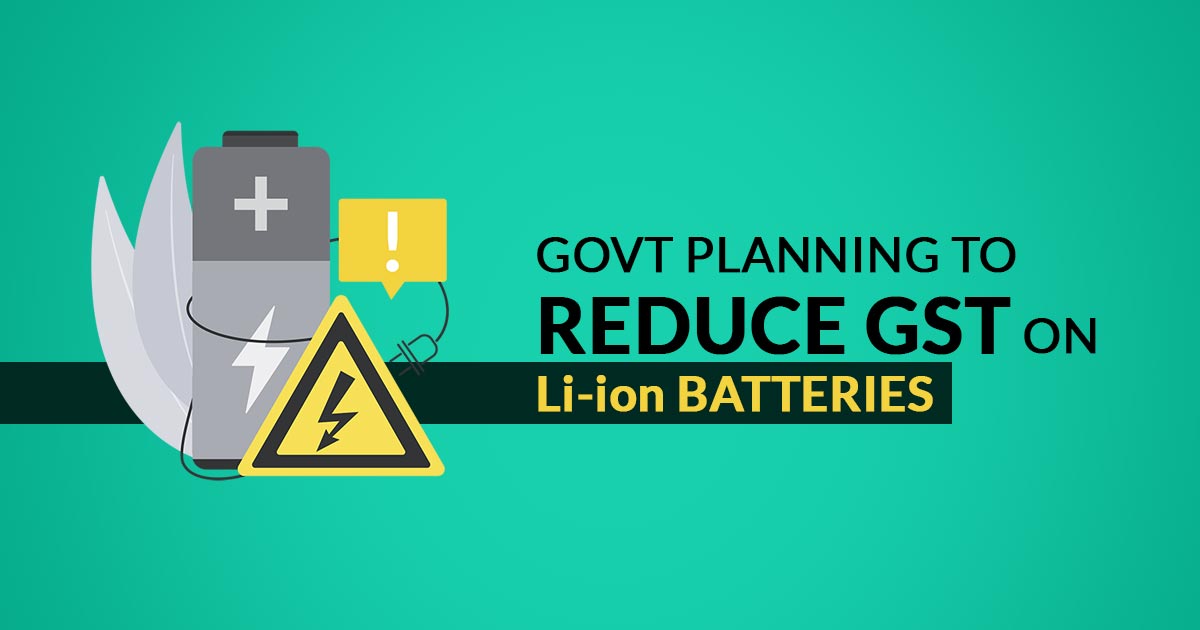
India may reduce the GST on lithium-ion batteries and bring them around the tax on electric vehicles (EVs) to boost its green mobility plans.
As per the update received, various stakeholders of the central government are discussing all the possible ways to make it possible. If this happens, then it will make the country a global manufacturing hub for electric vehicles.
There is a clear difference in the tax rates on EVs and Li-ion batteries, while the EVs are taxed at 5% Li-ion batteries are taxed at 18%. Those who are well aware of all the discussions said that similar talks had taken place in the past too, but with the battery swapping policy going forward, the conversations have picked up the pace again.
Ministry of NITI Aayog, New and Renewable Energy, Heavy Industries, and other government departments held their first meeting on the battery-swapping policy on Tuesday. After the meeting, they also received suggestions and recommendations on the draft policy until June 5. People said that apart from the rationalization of taxes, standardization of batteries to ensure interoperability was also on the agenda of the meeting.
NITI Aayog will not give much emphasis on the Goods and Services Tax (GST) issues as it comes under the umbrella of the Finance Ministry, but the best they can do is send the best recommendation on tax rationalization.
GST council will be responsible for taking any decision about changing the GST rates. It was the year 2018 when the council had last reduced the GST on lithium-ion batteries from 28% to 18%. Now, when the focus is on the EV ecosystem and more automakers entering this ecosystem, people are wondering about the price parity between batteries and EVs because the difference is very clearly visible.
Last year in December, Amitabh Kant, chief executive of NITI Aayog said that the government was considering the option of reducing the GST on electric vehicle (EV) batteries. In addition, the draft policy which was released by the think tank urged the rationalization of tax on the Li-ion batteries.
“The draft policy said As per the current GST regime, tax rates on lithium-ion batteries and electric vehicle supply equipment (EVSE) are 18% and 5%, respectively. The GST Council, the decision-making body on GST provisions, may consider reducing the differential across the two tax rates. The council will take an appropriate decision in this regard at a suitable time”.
The government think tank also recommended that the existing scheme can be modified or a new scheme can be introduced to provide more clarity and support to developers of battery-swapping stations.
The government may take around three months to develop a final policy and queries sent to the Ministries of NITI Aayog, New and Renewable Energy, Heavy Industries, and Finance stayed unanswered till press time.
Experts expressed that without rationalizing the GST rates on lithium-ion batteries, India’s EV ambitions may have to face some obstacles. They also said that If the government wants to promote electric vehicles, then they have to take rate cuts seriously.
The government is making continuous efforts to promote the manufacturing of electric vehicles and batteries in the country. In the same view, it launched a production-linked incentive scheme for advanced chemical cell battery storage with an expenditure of ₹18,100 crores to attract more companies to the sector.
As per government data number of domestic electric vehicle sales this April, stayed at 72,519 units, which is 14,179 more than what was sold a year earlier, but it is also reported that in March 77,243 units of EVs were sold.